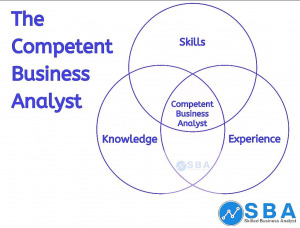The right mixture of knowledge, experience and skills makes a Business Analyst competent. Whether you are an entry level, intermediate or senior level Business Analyst these three areas are necessary for you to succeed in your role as Business Analyst. The Venn diagram below illustrates the three areas and how they contribute to a competent Business Analyst.

- Knowledge
It is fundamental for a Business Analyst to have knowledge in three key areas:
- Conceptual knowledge – understanding of the Business Analysis domain – key concepts, inputs, elements and BABOK areas. This knowledge can be fostered through professional qualifications such as ECBA, CCBA and CBAP.
- Procedural knowledge – practical application of Business Analysis – technical know-how to do Business Analysis. Procedural knowledge is fostered through experience and exposure in the workplace. Practical application of tools and techniques is critical for a Business Analyst.
- Organizational knowledge – understanding the organization and the industry space it is in. Business Analysts must understand their organization from a people, process and technology perspective. In addition to this, Business Analysts need to be outward looking to understand the market the organization plays in and the customers it caters for. This will enable us to build solutions that add value to the organizations in which we work.
- Experience
Experience to a Business Analyst is more than the number of years in the profession. In my career, I have come across Business Analysts who have a wide breadth of experience in the profession however the depth of experience was lacking. What do I mean by this? The breadth of experience refers to the number of years as a Business Analyst, whereas the depth of experience refers to the exposure they had whilst they were a Business Analyst. Exposure entails:
- Size and diversity of projects a Business Analyst has worked on
- Exposure to tools, techniques and technologies
- Exposure to agile and SDLC methodologies
It is therefore critical for Business Analysts to ensure that as they gain experience and years in the profession, they add to their depth of experience to ensure they are well rounded and marketable. I have been fortunate to be involved in the hiring process of Business Analysts throughout my career and one thing I always look for in an interview is the depth of experience especially when recruiting for Senior Business Analysts.
- Skills
The competent BA has a great combination of soft skills and hard skills. LinkedIn published the top skills companies are looking for in 2020 and the soft skills speak directly to what is needed for Business Analysts. Creativity, persuasion, collaboration, adaptability, emotional intelligence were the top 5 soft skills. In addition to this list I would add my all-time favorite soft skill– sound communication and interpersonal skills! In terms of hard skills, I would say the top 3 for a Business Analyst are problem solving skills, analytical skills and facilitation skills
As Business Analysts its always important to have these three areas in mind – it makes you aware of what you must do to keep relevant and up to date in the profession. Coming to the end of each year, I encourage my mentors to reflect on their BA career specifically looking at these three areas – knowledge, experience and skills.
Contact The Skilled Business Analyst today – we will empower you with tools evaluate yourself in each of these areas and discuss an action plan to get you to the next level in your career!
Yours in Analysis
Tendai
BA Instructor / Coach

